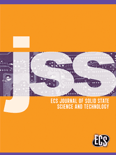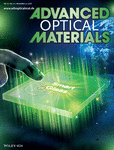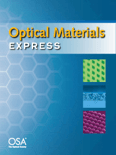
Optoelectronics and Advanced Materials-Rapid Communications
metrics 2024
Unveiling Breakthroughs in Optoelectronic Technologies and Materials.
Introduction
Optoelectronics and Advanced Materials-Rapid Communications is a pivotal journal in the field of optoelectronics, specializing in the rapid dissemination of original research and reviews concerning advanced materials and their applications. Published by the NATL INST OPTOELECTRONICS in Romania, this journal has been instrumental for researchers and professionals since its inception in 2008. With an E-ISSN of 2065-3824, it offers a platform for innovative studies across various disciplines, focusing on both theoretical and practical advancements in electrical and electronic engineering, as well as electronic, optical, and magnetic materials. Although currently categorized in the Q4 quartile based on the 2023 Scopus rankings, the journal is dedicated to enhancing its visibility and citation impact among the scientific community. By facilitating open access to cutting-edge research, Optoelectronics and Advanced Materials-Rapid Communications not only addresses the needs of emerging scholars and industry professionals but also contributes to the broader discourse on materials science. As it continues to evolve through 2024 and beyond, the journal remains an essential resource for those committed to advancing knowledge in optoelectronic technologies.
Metrics 2024
 0.14
0.14 0.50
0.50 0.30
0.30 32
32Metrics History
Rank 2024
Scopus
IF (Web Of Science)
JCI (Web Of Science)
Quartile History
Similar Journals

eLight
Illuminating the Future of Atomic and Molecular PhysicseLight is a leading academic journal published by SPRINGER NATURE, dedicated to the dynamic field of Atomic and Molecular Physics, as well as Electronic, Optical, and Magnetic Materials. Launched in 2021, the journal has quickly established itself as a reputable source of cutting-edge research, evidenced by its impressive Q1 quartile rankings in both categories for 2023, alongside remarkable Scopus rankings that place it in the top 2% of its fields. With a commitment to advancing knowledge and fostering innovation, eLight invites contributions from researchers, professionals, and students who are passionate about exploring new frontiers in these critical areas of study. Hitting a critical intersection of physics and materials science, the journal provides an open forum for the dissemination of experimental findings, theoretical studies, and application-based research, ensuring accessibility to vital discoveries that drive progress in technology and academia. Located in Singapore, eLight is poised to make significant contributions to the scientific community until at least 2024, and beyond.

ECS Journal of Solid State Science and Technology
Fostering Global Collaboration in Materials ScienceECS Journal of Solid State Science and Technology, published by the Electrochemical Society, is a prominent journal dedicated to the advancement of research in the field of electronic, optical, and magnetic materials. With an ISSN of 2162-8769 and an E-ISSN of 2162-8777, this journal has established a significant presence since its inception in 2012, spanning critical developments in solid-state science that are essential for innovative technologies. Operating within the United States and recognized for its global outreach, it holds a respectable Q3 category ranking in the materials science category as of 2023, reflecting its commitment to high-quality research and its role in bridging theoretical and applied aspects of materials science. Researchers, professionals, and students alike will find vital information and cutting-edge studies that further the understanding and applications of solid-state technologies. The journal is accessible to an extensive audience, making it an invaluable resource for those engaged in the ever-evolving landscape of materials science.

Journal of Ovonic Research
Bridging Theory and Application in Material Technologies.Journal of Ovonic Research is a distinguished publication dedicated to advancing the fields of electronic, optical, and magnetic materials. Published by VIRTUAL CO PHYSICS SRL, this journal offers a platform for researchers to share innovative findings and developments that push the boundaries of technology and materials science. With an ISSN of 1842-2403 and an E-ISSN of 1584-9953, it provides an important service to the academic community, particularly within Romania and beyond. Despite its recent inception in 2011, the journal has gained traction in the academic landscape, reflecting a Q4 quartile ranking in crucial categories such as Electronic, Optical and Magnetic Materials, as well as in Physics and Astronomy. The Scopus rankings further underscore its positioning, ranking within the 25th to 37th percentile across various disciplines, making it a valuable resource for professionals and students alike. Although the journal currently operates on a non-open access basis, it remains committed to exploring the latest advancements in materials science, encouraging interdisciplinary collaboration and fostering a deeper understanding of surface, coating, and film technologies. As the field evolves, Journal of Ovonic Research stands as a beacon for scholarly communication, bridging the gap between research and practical application.

OSA Continuum
Transforming Discoveries into Practical SolutionsOSA Continuum, published by the Optica Publishing Group, is a distinguished open access journal dedicated to advancing research in the realms of Atomic and Molecular Physics, Optics, and Electronic and Electrical Engineering. Since its inception in 2018, this journal has rapidly positioned itself as a significant platform for disseminating cutting-edge findings, achieving impressive Scopus rankings with a 61st percentile in Electrical and Electronic Engineering and 57th in Atomic and Molecular Physics. Based in the United States, the journal not only promotes scholarly dialogue among researchers and professionals but also plays a crucial role in bridging theoretical advances with practical applications in optical and material sciences. Its open access format ensures broader visibility and accessibility of research outputs, fostering innovation and collaboration across disciplines. With its ongoing commitment to excellence, OSA Continuum is crucial for anyone involved in these dynamic fields.

Advanced Optical Materials
Shaping Tomorrow’s Innovations in Material ScienceAdvanced Optical Materials, published by WILEY-V C H VERLAG GMBH, stands as a premier journal within the fields of atomic and molecular physics, as well as electronic, optical, and magnetic materials. With a substantial impact factor reflecting its significance—ranking in the Q1 category among both Atomic and Molecular Physics and Electronic, Optical and Magnetic Materials—this journal offers a vital platform for disseminating groundbreaking research. The journal's Scopus rank positions it at an impressive 14th out of 224 in its category and 25th out of 284 in materials science, illustrating its commitment to advancing knowledge and innovation. Covering a diverse range of topics and trends from 2013 to 2024, Advanced Optical Materials is essential for researchers, professionals, and students who are exploring the cutting-edge developments in optical technologies. Despite not being open access, the journal provides high-quality peer-reviewed articles that contribute substantially to the academic community, helping to shape the future of materials research.

Korean Journal of Materials Research
Empowering Researchers in the World of MaterialsKorean Journal of Materials Research is a pivotal publication in the field of materials science, offering a platform for innovative research and comprehensive reviews in miscellaneous materials applications. Published by the MATERIALS RESEARCH SOC KOREA, this journal has been a valuable resource since its inception in 2007 and continues to disseminate vital findings through 2024. Although currently categorized in Q4 of the Materials Science quartiles, the journal is committed to advancing knowledge and fostering research collaboration within the scientific community. With an ISSN of 1225-0562 and an E-ISSN of 2287-7258, the journal aims to bridge gaps in research and practice, appealing to a diverse audience of researchers, professionals, and students interested in the latest advancements in materials science. While access to content may not be open, the journal's impact in the regional and global research landscape is steadily growing, as indicated by its Scopus ranking in the 7th percentile of General Materials Science. Engage with the Korean Journal of Materials Research to stay at the forefront of materials innovation!

Journal of Computational Electronics
Bridging Disciplines for Enhanced Electronic InnovationJournal of Computational Electronics, published by Springer, is a leading international journal that caters to the interdisciplinary field of computational modeling and simulation, particularly within atomic and molecular physics, electrical and electronic engineering, and electronic materials. Since its inception in 2002, the journal has established itself as an essential resource for researchers, professionals, and students, providing a platform for disseminating innovative research and advancing methodologies related to electronic systems. With its current Q3 ranking across multiple categories—including Atomic and Molecular Physics, Engineering, and Materials Science—the journal plays a significant role in shaping the future of computational approaches in relevant fields. While it is not an open access journal, its rigorous peer-review process ensures high-quality content, reflecting the latest advancements and insights. The Journal of Computational Electronics continues to contribute to scholarly discourse, supporting the development of cutting-edge technologies and theoretical frameworks essential for the evolving landscape of electronics.

Optical Materials Express
Pioneering discoveries in the realm of optical materials.Optical Materials Express is a leading open-access journal dedicated to the rapid dissemination of research in the field of optical materials, published by the esteemed Optica Publishing Group. Since its inception in 2012, the journal has played a pivotal role in advancing knowledge and innovation in Electronic, Optical, and Magnetic Materials, currently maintaining a commendable Q2 classification in the 2023 category rankings. With a Scopus rank of 86 out of 284 in its category, the journal proudly boasts a 69th percentile positioning, underscoring its impact and relevance within the scientific community. The journal publishes high-quality, peer-reviewed articles that explore both fundamental and applied aspects of optical materials, making it an essential resource for researchers, professionals, and students alike. Located in Washington, DC, and accessible to a global audience, Optical Materials Express continues to foster collaboration and innovation among scholars in this vibrant field.

SEMICONDUCTORS
Advancing the frontiers of semiconductor research.SEMICONDUCTORS, published by PLEIADES PUBLISHING INC, is a prominent journal that provides a platform for researchers and professionals in the fields of Atomic and Molecular Physics, Condensed Matter Physics, and Electronic, Optical and Magnetic Materials. With an ISSN of 1063-7826 and an E-ISSN of 1090-6479, the journal has been diligently disseminating knowledge since its inception in 1996 and continues to pave the way for innovative research until 2024. Although currently unclassified in the Open Access model, its influence is underscored by its rankings in Scopus, where it ranks in the 21st-22nd percentile across critical scientific categories. SEMICONDUCTORS serves as an essential resource for cutting-edge research, fostering a greater understanding of semiconductor materials and their applications, thereby assisting the scientific community in pushing the boundaries of technology and innovation.

Journal of Optoelectronic and Biomedical Materials
Exploring New Frontiers in Optoelectronic ApplicationsJournal of Optoelectronic and Biomedical Materials (ISSN: 2066-0049) is a peer-reviewed academic journal published by the renowned VIRTUAL INSTITUTE OF PHYSICS, dedicated to advancing research in the interdisciplinary fields of optoelectronics and biomedical materials. This journal aims to provide a platform for researchers, professionals, and students to disseminate their findings on innovative materials and technologies that harness optical and electronic properties for biomedical applications. With an increasing significance in medical diagnostics, therapeutic approaches, and advanced materials science, the Journal of Optoelectronic and Biomedical Materials underscores the importance of facilitating collaboration among scientists from diverse fields. While currently operating under a traditional access model, the journal aspires to enhance global accessibility to cutting-edge research contributions that will drive the future of technology in healthcare and biotechnology. As a growing reference point in its domain, it encourages submissions that can advance these crucial scientific areas.